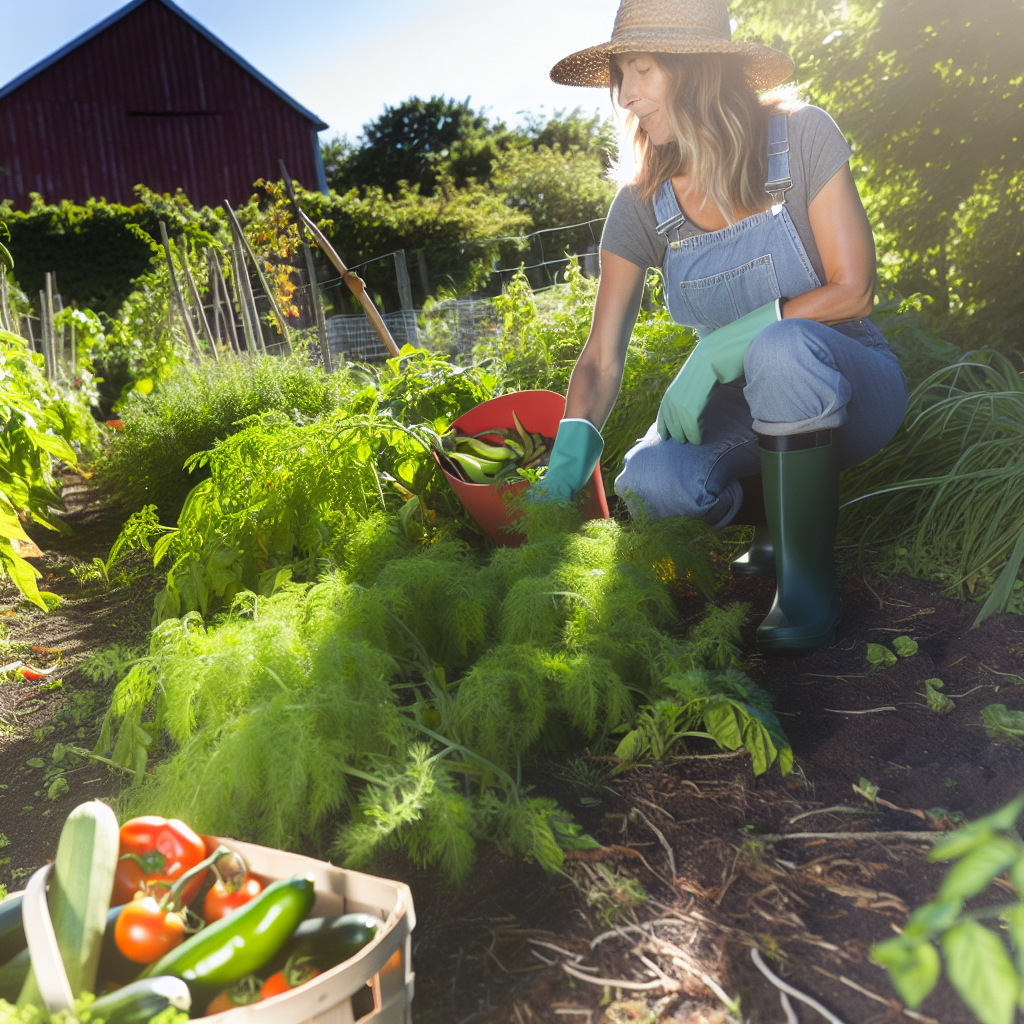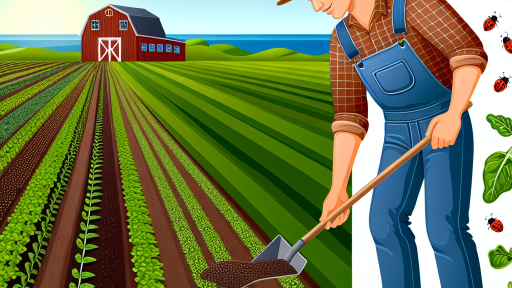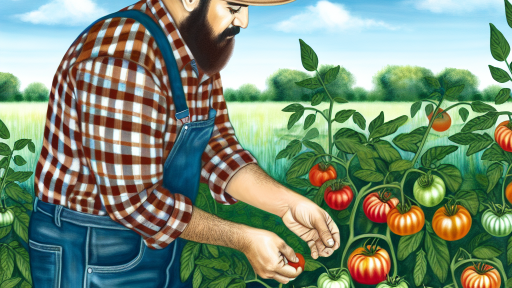Introduction to Organic Gardening
Organic gardening encourages sustainable practices for growing food.
This method prioritizes environmental health and biodiversity.
It focuses on nurturing soils, plants, and wildlife, which benefits ecosystems.
Moreover, organic gardening avoids harmful chemicals, promoting safety for consumers.
As a result, it yields food that is free from pesticides and synthetic fertilizers.
This promotes healthier eating habits and reduces health risks associated with chemicals.
Importance of Organic Gardening
Organic gardening plays a crucial role in preserving natural resources.
It helps support local ecosystems and encourages a balanced environment.
In addition, this practice enhances soil fertility through natural composting methods.
Healthy soil leads to robust plants and richer harvests over time.
Furthermore, organic gardens contribute to reducing carbon footprints.
They store carbon in soil, which mitigates climate change effects.
Benefits for Personal Health
Engaging in organic gardening leads to fresh, nutritious produce.
Consuming organic fruits and vegetables can strengthen overall health.
Research shows organic food may contain higher antioxidant levels.
Transform Your Agribusiness
Unlock your farm's potential with expert advice tailored to your needs. Get actionable steps that drive real results.
Get StartedIn addition, gardening itself provides physical and mental health benefits.
It encourages outdoor activity, reducing stress and promoting well-being.
Moreover, it fosters a deep appreciation for nature and stewardship of the environment.
Community and Economic Advantages
Organic gardening also strengthens community ties and supports local economies.
Community gardens can bring neighbors together for a common purpose.
They promote sharing resources and knowledge among gardeners.
Additionally, organic produce often fetches higher prices at markets.
This can lead to increased revenue for local farmers and growers.
Consequently, there is a greater investment in sustainable agricultural practices.
Essential Hand Tools
Trowels
Trowels are indispensable tools for any gardener.
They help you plant seedlings and dig small holes.
Moreover, they assist in transplanting plants with care.
Choose a trowel with a comfortable handle for extended use.
Stainless steel trowels resist rust and offer durability.
Pruners
Pruners are crucial for maintaining plant health.
Regular pruning promotes healthier growth and blooms.
Look for bypass pruners for a clean cut.
Extendable pruners make it easier to reach higher branches.
Keep your pruners sharp to ensure efficient cuts.
Cultivators
Cultivators are useful for breaking up the soil.
They help aerate and prepare the ground for planting.
Consider hand cultivators for working in tight spaces.
You can also find larger, claw-like cultivators for bigger gardens.
Using a cultivator regularly improves soil quality over time.
Showcase Your Farming Business
Publish your professional farming services profile on our blog for a one-time fee of $200 and reach a dedicated audience of farmers and agribusiness owners.
Publish Your ProfilePower Tools for Organic Gardening
Tillers
Tillers are essential for breaking up compacted soil.
They make it easier for roots to spread and grow.
Using a tiller saves time compared to manual tools.
Choose a tiller that suits your garden size and soil type.
An electric tiller is perfect for small gardens.
On the other hand, a gas-powered tiller handles larger areas effectively.
When using a tiller, work in small sections for best results.
Making multiple passes can help achieve the desired soil texture.
Remember to clean the tiller after each use to maintain its performance.
Wood Chippers
Wood chippers are ideal for disposing of garden debris.
They convert branches and leaves into mulch or compost.
Using a chipper reduces the volume of waste significantly.
Select a chipper that matches your garden’s waste disposal needs.
A portable chipper is convenient for smaller gardens with limited space.
When operating a chipper, always wear protective gear for safety.
Feed material slowly to avoid clogging the machine.
Chipped material can also enhance soil quality as compost.
Regular maintenance ensures your chipper runs effectively and lasts longer.
Choosing the Right Equipment
Selecting the right power tools is critical for success.
Evaluate your gardening needs before making a purchase.
Consider the size of your garden and types of plants you grow.
Budget is also an important factor in your decision-making process.
Invest in quality tools that are durable and reliable.
Maintenance is essential to keeping your tools in good condition.
Always read the manual for proper usage and safety guidelines.
Research online reviews to gain insight into different models.
Find Out More: Urban Farming Success Stories To Inspire
Soil Care Tools
Compost Bins
Compost bins are essential for creating nutrient-rich compost.
Each bin serves as a storage unit for organic waste.
They help reduce landfill waste, promoting sustainability.
Choosing the right type of bin influences compost quality.
Consider different sizes based on your garden’s needs.
You can opt for stationary or rotating bins.
Soil Testers
Soil testers measure pH levels and nutrient content effectively.
Using these tools helps assess soil health accurately.
Testing reveals deficiencies in nutrients, guiding amendments.
Regular testing ensures optimal growing conditions for plants.
Many testers are user-friendly and provide quick results.
Spreaders
Spreaders distribute seeds and fertilizers evenly across your garden.
This tool maximizes coverage while minimizing waste.
Showcase Your Farming Business
Publish your professional farming services profile on our blog for a one-time fee of $200 and reach a dedicated audience of farmers and agribusiness owners.
Publish Your ProfileChoosing between manual and powered models depends on your garden size.
Regular use ensures a uniform application of nutrients.
Additionally, some spreaders can handle different materials, enhancing versatility.
Find Out More: Water-Efficient Edible Landscape Designs
Watering Equipment: Drip Irrigation vs. Traditional Hose
Understanding the Importance of Efficient Watering
Efficient watering is vital for healthy growth in organic gardens.
Strong plants require consistent moisture for optimal development.
Choosing the right watering method can improve efficiency and effectiveness.
Examining Drip Irrigation
Drip irrigation delivers water directly to the plant roots.
This method reduces evaporation and runoff, conserving water.
Furthermore, it minimizes weed growth by focusing moisture on plants.
By using a timer, gardeners can automate their watering schedule.
This automation ensures consistent hydration even in busy seasons.
Benefits of Drip Irrigation
- Higher efficiency with water use.
- Reduces risk of fungal diseases due to consistent dryness on leaves.
- Enables targeted watering for specific plants.
Exploring Traditional Hose Use
Traditional hoses provide flexibility in watering different areas.
They are easy to set up and can reach far distances.
However, using a hose can lead to uneven watering.
Overhead watering may waste water through evaporation.
Benefits of Using a Traditional Hose
- Affordability and accessibility for most gardeners.
- Quick setup with minimal initial investment.
- Allows for easy adjustments while watering.
Comparing Both Methods
Drip irrigation is better for long-term efficiency and plant health.
On the other hand, traditional hoses offer immediate usability.
Consider factors like garden size, plant types, and budget.
Ultimately, the best choice depends on individual gardening goals.
Find Out More: Efficient Watering Systems For Container Gardening

Pest Management Tools
Natural Pesticides
Natural pesticides offer a safe alternative to chemical solutions.
Plant-based oils, like neem oil, deter pests effectively.
Furthermore, essential oils can disrupt insect behavior.
Garlic spray acts as a natural insect repellent.
In addition, diatomaceous earth safely eliminates crawling insects.
Utilizing these options encourages safe practices in your garden.
Traps and Barriers
Implementing traps helps minimize pest populations efficiently.
Sticky traps capture flying insects swiftly.
Insect netting protects plants from harmful pests.
Additionally, pheromone traps attract specific pests away from plants.
Using row covers can shield seedlings from various insects.
These barriers can make a significant difference in pest management.
Companion Planting
Companion planting offers a strategic approach to pest control.
Certain plants repel pests naturally when grown together.
For instance, marigolds deter nematodes and aphids.
Basil can repel flies and mosquitoes, benefiting nearby crops.
Moreover, planting onions alongside carrots confuses pests.
This method promotes a healthier and more resilient garden ecosystem.
Encouraging Beneficial Insects
Attracting beneficial insects aids in pest control organically.
Showcase Your Farming Business
Publish your professional farming services profile on our blog for a one-time fee of $200 and reach a dedicated audience of farmers and agribusiness owners.
Publish Your ProfileLadybugs consume aphids and other harmful pests readily.
Lacewings feed on various insect larvae, helping protect plants.
Planting native flowers can draw in pollinators and pest predators.
Creating a diverse garden environment supports these helpful insects.
This strategy fosters a balanced ecosystem in your garden.
Explore Further: Vertical Container Gardening Ideas For Farmers
Harvesting Tools
Scissors
Scissors are essential for harvesting delicate plants.
They allow for precise cuts without damaging the surrounding foliage.
Look for a pair that offers a comfortable grip.
Consider models with spring-loaded features for ease of use.
Always keep them sharp for effective harvesting.
Baskets
Baskets are perfect for collecting your harvest efficiently.
Choose a lightweight basket that is easy to carry.
Make sure it has breathable materials to keep produce fresh.
Opt for collapsible designs for convenient storage when not in use.
Baskets also help prevent bruising during transportation.
Buckets
Buckets can handle larger harvests, making them versatile tools.
Select buckets with sturdy handles for ease of transport.
Consider using different sizes for various types of produce.
Color-coded buckets can help you organize your harvest.
Ensure that buckets are clean and suitable for food storage.
Seasonal Maintenance Tools
Mulchers
Mulchers are essential for maintaining a healthy garden.
They help reduce yard waste, turning it into valuable mulch.
This process enriches the soil by adding organic matter.
Moreover, mulch conserves moisture and suppresses weeds.
Investing in a high-quality mulcher can save time and effort.
- Choose a mulcher suitable for your garden size.
- Opt for electric or gas models based on your preference.
- Ensure it can handle the type of debris you generate.
Leaf Blowers
Leaf blowers play a vital role in garden maintenance.
They make the cleanup process faster and more efficient.
This tool helps clear leaves and debris from walkways.
Additionally, it’s great for collecting leaves into piles.
Consider the features that matter most for your needs.
- Look for variable speed settings for better control.
- Choose between handheld or backpack models.
- Check for noise levels if you live in a sensitive area.
Additional Resources
Maximizing Production For a Small-Scale Flower Farm — Sierra …




